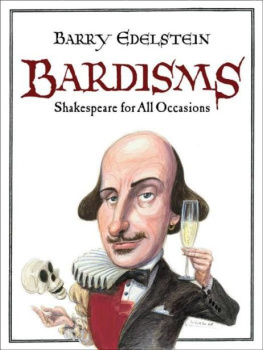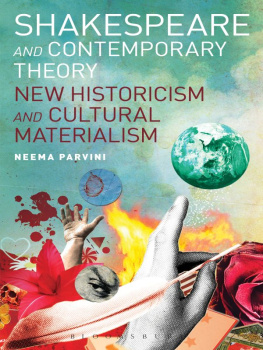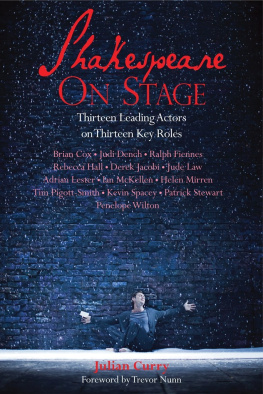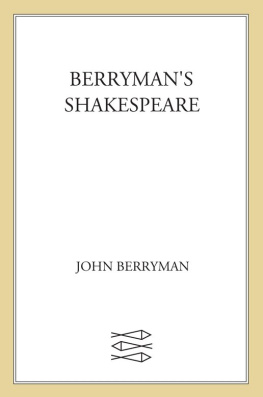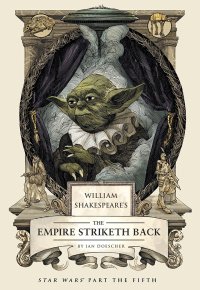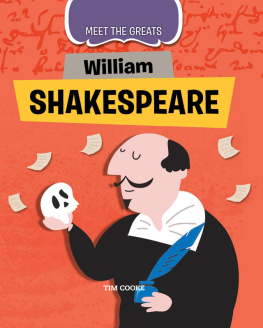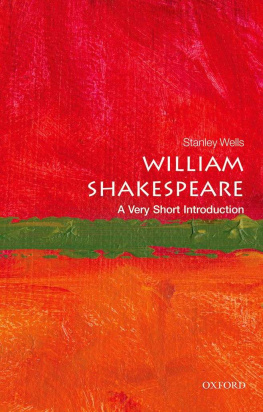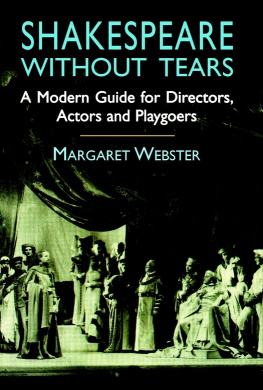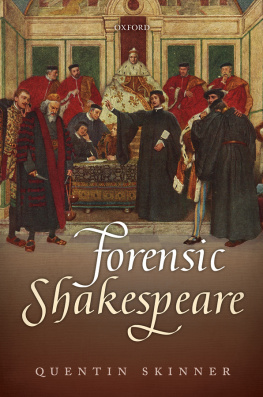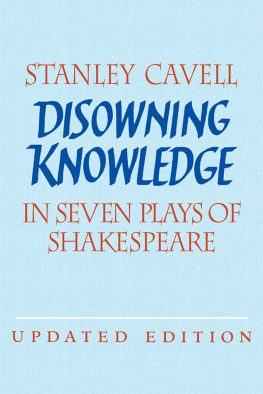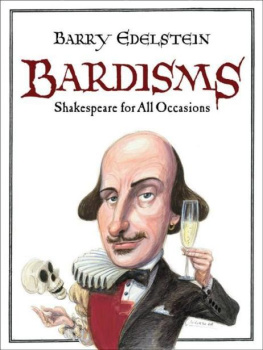Wonderful Words from the Bard on Lifes Big Moments (and Some Small Ones, Too) Plus Tips on How to Use Them in a Toast, Speech, or Letter
INTRODUCTION
O let my books be then the eloquence
S ONNET 23.9
Some years ago I was called upon to speak in public at a number of big life moments that took place over the course of a short span of months. Two of my best friends got married, and I toasted them. I got married, and I spoke at engagement parties, in the ceremony itself, and in a toast to my bride at the reception. I stepped down from a long-held post, and I saluted my staff and supporters. I roasted a colleague at a swank party for a watershed birthday, and I eulogized a dear family friend at a quiet memorial service.
Casting about for inspiration as I prepared my remarks for each event, I turned immediately to a volume thats been at the heart of my professional career for nearly two decades. That tome is Western literatures greatest repository of wit, wisdom, solace, spiritual nourishment, poetic uplift, psychological insight, emotional passion, poetic virtuosity, and just plain beautiful writing: The Complete Works of William Shakespeare .
The Bard didnt let me down. Through my work directing, writing about, and teaching him, I knew his canon pretty well cold. But I was dazzled to find the incredible number of passages in his plays and poems that seemed tailor-made for celebrations, personal milestones, and just about every one of lifes big moments. Shakespeare, I was relieved and delighted to discover, is pitch-perfect for all occasions.
Soon Id collected Shakespeare quotations for my various needs.
For my best friend and his bride, whose love for one another struck me as uncommonly deep, I talked about this line from As You Like It : My love hath an unknown bottom, like the Bay of Portugal. (I explained that in Shakespeares day, the Bay of Portugal was thought to be the deepest body of water on Earth, so any love thats like it must be pretty darned deep.)
At a religious ceremony the weekend before my wedding, during which the story of Noah was read from the Bible, I commented on the amazing fact that theres a line in Shakespeare that actually talks about both weddings and also old Noah himself (its in As You Like It as well, when Jaques the cynic encounters a gathering of three betrothed pairs and says: There is, sure, another flood toward, and these couples are coming to the ark).
At my colleagues fiftieth birthday party, I reassured him with this line from Sonnet 104: To me, fair friend, you never can be old.
And at my family friends funeral, I shared this beautiful passage from the little-known play Cymbeline :
Fear no more the heat o the sun,Nor the furious winters rages;Thou thy worldly task hast done,Home art gone, and taen thy wages:Golden lads and girls all must,As chimney-sweepers, come to dust.
In the years since that run of toasts and tributes, Ive quoted Shakespeare on even more varied occasions, sometimes when speaking in public, but just as often when sending a note or even when simply musing to myself:
On the occasion of my parents fiftieth wedding anniversary: The benediction of these covering heavens / Fall on their heads like dew, for they are worthy / To inlay heaven with stars!
On the occasion of a magnificent sunrise over Joshua Tree National Park: But look, the morn in russet mantle clad / Walks oer the dew of yon high eastward hill.
On the occasion of hearing a grandmother tell her grandson not to eat so fast: With eager feeding, food doth choke the feeder.
And on the occasion of my godsons bris : This was the most unkindest cut of all.
Before long, people who had heard me wax Shakespearean on some occasion or other began to call or e-mail me for advice.
Hey Barry, Ive also got to give a toast at a friends wedding. Is there a good Shakespeare quote you can send my way?
Yikes! I have to make a presentation in front of the whole company at a product launch next week. Got any Shakespeare for me?
Baz, I went out with a really great girl last night and I totally fell for her. I want to send her an e-mail asking her out on another date. Can you shoot me some good Shakesey thatll really blow her away?
I had a great time answering every request.
Shakespeare for the Occasion of a Wedding? Try Sonnet 116, the nuptial classic: Let me not to the marriage of true minds / Admit impediments.
Shakespeare for the Occasion of a Pep Talk? Lots of great choices. Check out There is a tide in the affairs of men / Which taken at the flood leads on to fortune, from Julius Caesar , or We few, we happy few, we band of brothers, from Henry V .
Shakespeare for the Occasion of Seeking a Second Date? Heres a good one from The Tempest : I would not wish / Any companion in the world but you.
Fielding countless such requests, and dispatching hundreds of lines of Shakespeare to family, friends, and acquaintances from all over who were in the midst of life events of every kind, it occurred to me that what I was doing was something that Shakespeare himself would have recognized. Theres a moment in Hamlet when the eponymous prince, thunderstruck at the discovery that his seemingly charming and gregarious uncle is in fact a fratricidal maniac, decides to write down that piece of information for future reference: My tables, he cries, referring to his tablebook, a kind of Elizabethan notepad,
My tablesmeet it is I set it downThat one may smile and smile and be a villain.At least Im sure it may be so in Denmark.
Modern audiences chuckle at the odd sight of a man whos just met his fathers ghost taking the time to jot down the general life lesson hes learned in the process. But audiences in the Renaissance wouldnt have found the behavior the least bit peculiar. They, like Hamlet, routinely took note of epigrams and aphorisms, memorable turns of phrase, and other useful bits and bobs of knowledge encountered in their reading or their lives. They collected these linguistic cuttings, organized into categories, in scrapbooks called Commonplace Books, a commonplace being any adage, axiom, or maxim that seemed to express some pearl of wisdom about some universal human condition or situation. The English Renaissance, a period when the classical profundities of the sage ancients were revered as the highest possible cultural values, was the heyday of these books. They were regarded as so essential to living a properly intellectual life that the technique of keeping a good Commonplace Book was taught in school, and they were so beloved that they became a literary subgenre, and eminent scholars and gentlemen often published theirs to benefit the wider reading public.

